Dedicated research, persistent pursuit of solutions to this malignant disease, and showing the utmost care and empathy are the ways Dr Basma chooses to support cancer patients at FV.
“Excellent expertise, a distinctive personality, dedication, and exceptional communication skills,” are the words colleagues use to describe Dr Basma M’Barek, the head of Hy Vong Cancer Care Centre at FV Hospital.
Dr Basma has dedicated almost 25 years to oncology care, including 18 years working in France and six years in Vietnam, and remains passionately committed to her profession. She speaks with fervour about her specialty, the challenges faced by her patients, and the promising prospects of cancer treatments. She asserts, “No matter how slim the hope, we never give up on our patients.”
Dr Basma chose Vietnam to open a new chapter in her career
Over 26 years ago, when choosing a specialty, Dr Basma did not hesitate to pursue oncology, despite the limitations in treatment methods and medical technology at the time.
“Back then, a cancer diagnosis was considered a death sentence, and choosing such a challenging specialty as a medical student might have seemed untimely. But I thought differently; I believed that this is a field where, if you work well, you can have a significant impact. Despite its many challenges, specialising in oncology offers the opportunity to save many lives and drive progress,” Dr Basma says, explaining her decision.
Dr Basma embarked on her journey into the oncology specialty with a passionate heart, filled with energy and a desire to contribute to medical science. She spent much time studying, training, and developing in advanced medical environments in Europe.
As predicted by the young doctor, the techniques, methods, and cancer treatment medicines available have progressed remarkably.
After 18 years of working in major hospitals in France and achieving many career advancements, Dr Basma, who was then heading the oncology unit of a French hospital, began thinking about how to contribute and help cancer patients even more.
“I believe the impact a doctor can make in a developing country is more significant and can help more people. I am convinced that supporting and spreading medical knowledge and achievements more widely is a sustainable way to develop and provide effective treatment opportunities for patients,” Dr Basma expressed.
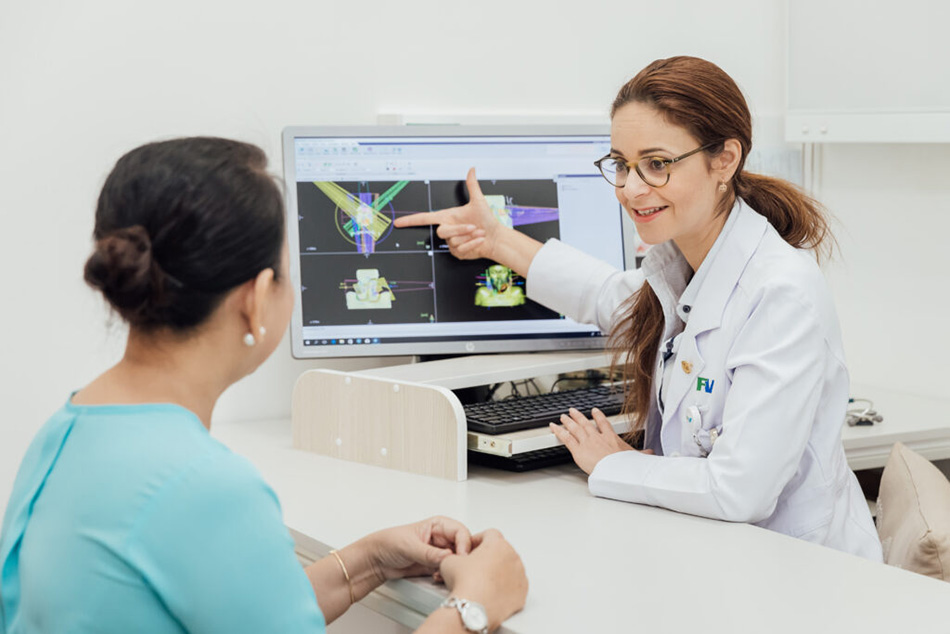

With that direction in mind, the French doctor began searching for the right environment to start the next chapter of her career. Then, the opportunity came to her just as she had envisioned: in a developing country with many gaps in medical treatment, a hospital eager to bring in the latest scientific advancements and located in a sunny city, offering a change from the rainy, humid weather where Dr Basma was working at the time.
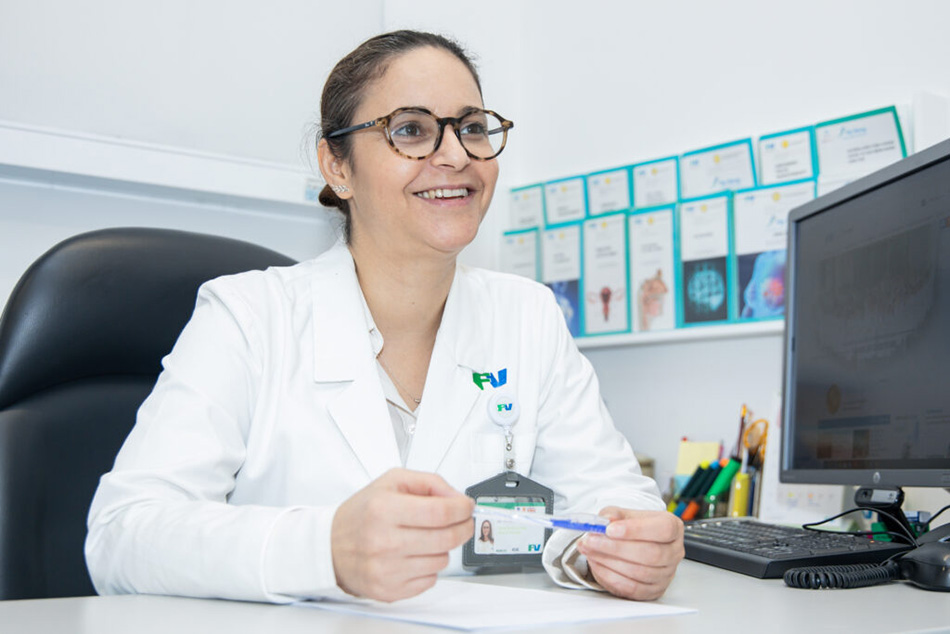
“I believe the impact a doctor can make in a developing country is more significant and can help more people.”
Dr Basma M’Barek, Head of Hy Vong Cancer Care Centre.
“The project at FV was very similar to a project I had previously worked on. At that moment, I felt as if everything was ‘designed’ for me to come here. So, I accepted the next challenge,” Dr Basma recalls.
Arriving in Vietnam with nearly two decades of rich experience and extensive knowledge from leading hospitals in France, Dr Basma almost had to start anew at FV. The new environment, communication style, and local culture presented many pressures and surprises for the young head of department.
Recalling her first impressions of working with Dr Basma, Ms Bao Anh, an Oncology Social Worker at Hy Vong Cancer Care Centre at FV Hospital, expressed: “Initially, the communication styles and choices of the patients’ families surprised her because they almost made all the decisions for the patient. Dr Basma felt this was not appropriate and discussed it with us to find the best solution to change this cultural norm. Nearly all her thoughts are focused on the patients and how to ensure they receive treatment in the best possible context.”
Dr Basma also observed that Vietnamese people tend to express their emotions discreetly or not at all. This reaction makes it difficult for doctors to support, assist, and advise patients effectively. Suppressing emotions sometimes leads patients to psychological stress, depression, and even refusal to undergo treatment.
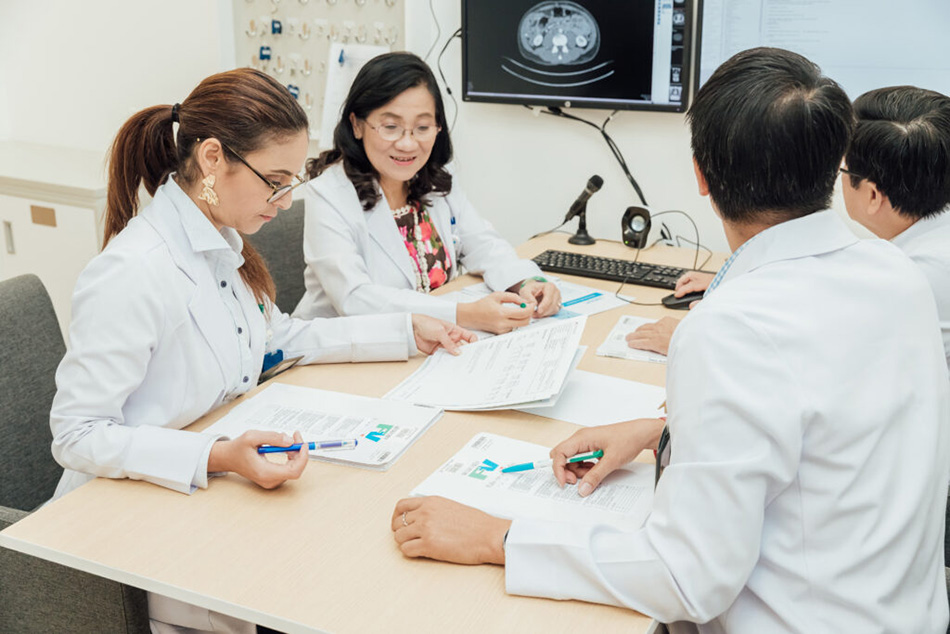

“Who wouldn’t feel pain, sadness, anger, or shock upon hearing they have cancer! Patients need to release their emotions rather than suppress them. They need timely assistance instead of enduring alone. This is something I always ponder and hope patients understand that they can share their feelings and rely on help from everyone around them, especially our doctors,” she adds.
Accompanying patients and striving to go the distance with them
According to Dr Basma, what puts cancer patients in difficult psychological situations when receiving information about their illness is their lack of understanding about current medical advancements and still viewing cancer as a “death sentence.”
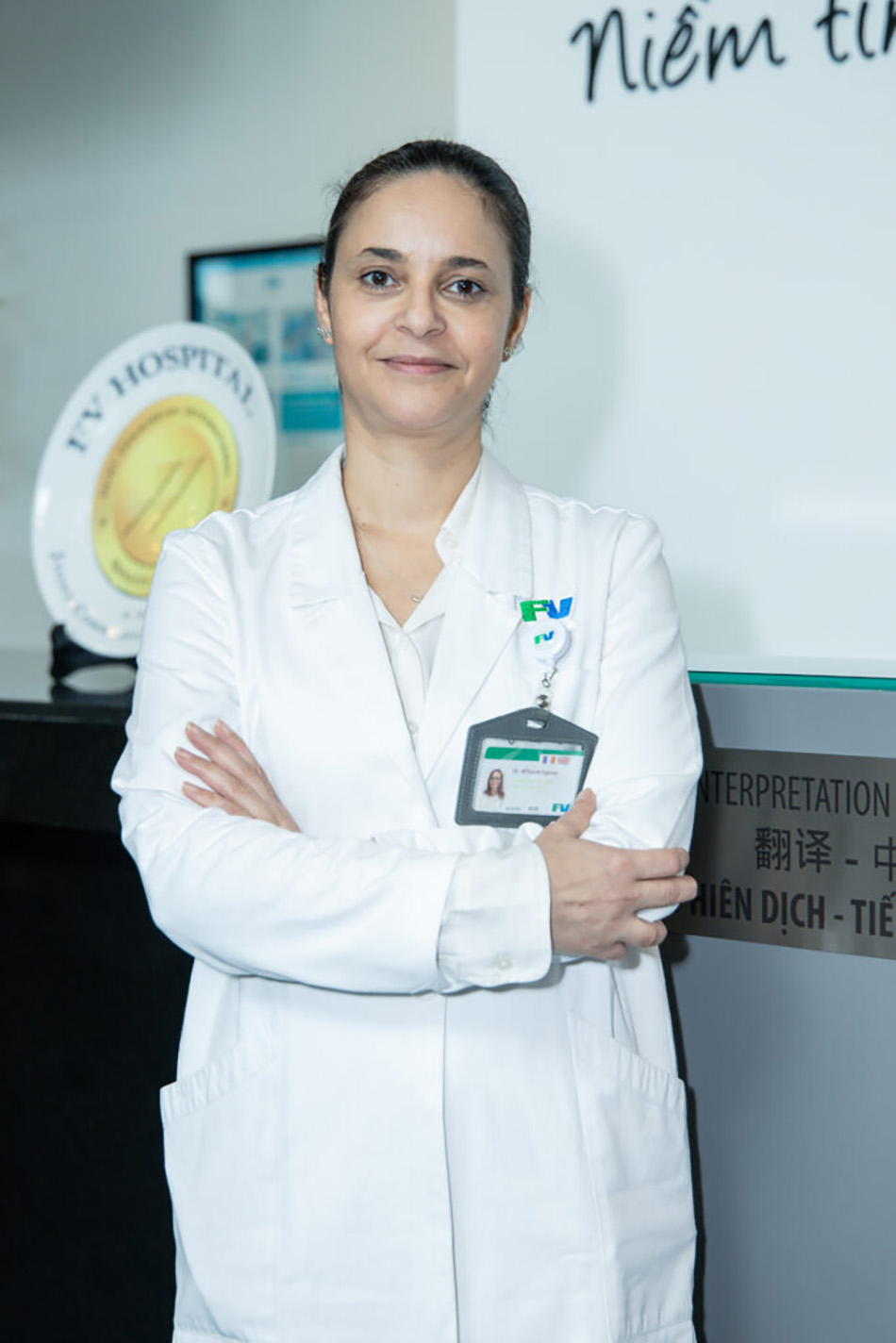
“The project at FV was exactly like a project I had previously worked on. At that moment, I felt as if everything was ‘designed’ for me to come here. So, I accepted the next challenge”.
Dr Basma M’Barek – Head of Hy Vong Cancer Care Centre
This reality is also one of the reasons why Dr Basma chose to stay with FV. Hy Vong Cancer Care Centre is constantly updated with the latest medical advances and FV invests heavily in technology and scientific tools. Dr Basma believes that when enough trust is built for patients in terms of treatment capabilities and the best medical services, patients will have more hope that they can be successfully beat their cancer.
“Throughout the treatment process, the team and I always accompany the patients at every stage of their physical and psychological journey. Even with patients who come here with only a few percent chance of success, we still go all out until the end, never giving up,” emphasised the French doctor.
In addition to treatment, Dr Basma also emphasises the importance of cancer screening. She is concerned that cancer screening in Vietnam is still not given enough attention. Cancer patients often come to the hospital when the disease has progressed to advanced stages with severe symptoms, greatly affecting the chances of treatment.
“Up to 90 per cent of cancer cases can be cured if detected in the early stages. So, it’s heartbreaking to see patients coming here at a stage where they only have a 20 per cent chance of recovery,” Dr Basma added.
Her research efforts empower Dr Basma to make greater contributions to her field.
During her time working in Europe, Dr Basma made great gains and earned the trust of the medical community there. However, when embarking on a new journey in Vietnam, she had to essentially start from the most basic steps to understand, integrate, and gain trust within the local medical community.
The initial difficulties were there, but with her extensive experience and excellent professional capabilities, Dr Basma’s journey to connect with her peers was considerably shortened. Continuously applying advanced treatment techniques and participating in seminars and events to sharing new achievements gave Dr Basma and her colleagues opportunities to share knowledge and experiences with each other.
As one of the leading cancer treatment hubs in Vietnam, in recent years, Hy Vong Cancer Care Centre has also held seminars to share research advances in cancer care with both the domestic and international medical communities. The key factor connecting the medical community in Vietnam and leading international physicians? None other than the young head of department at FV.
“FV is truly an international hospital. We connect with doctors in Europe, the medical community in India, and incorporate many advanced techniques developed around the world and apply them to treat Vietnamese patients. Having succeeded at Hy Vong Cancer Care Centre, we also aim to support and assist the medical community in Vietnam in accessing this knowledge.
“If they cannot yet invest in scientific and technical fields, at the very least, they can grasp the knowledge and conduct research for future application, bringing the greatest benefit to patients,” Dr Basma enthusiastically remarked.
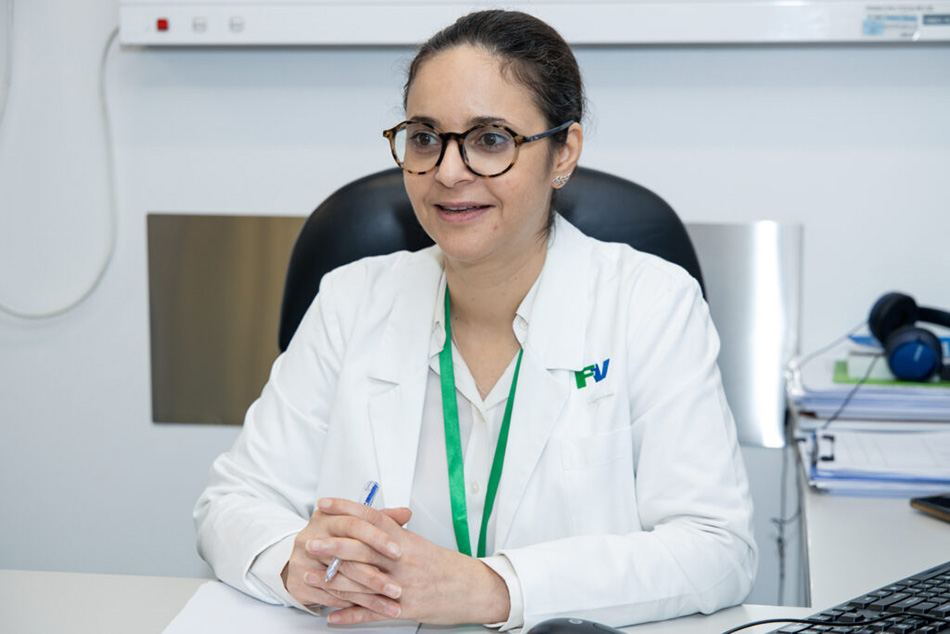
“The modern equipment and advanced techniques at FV are on par with the advancements of leading medical institutions in Europe or the United States”
Dr Basma M’Barek, Head of Hy Vong Cancer Care Centre

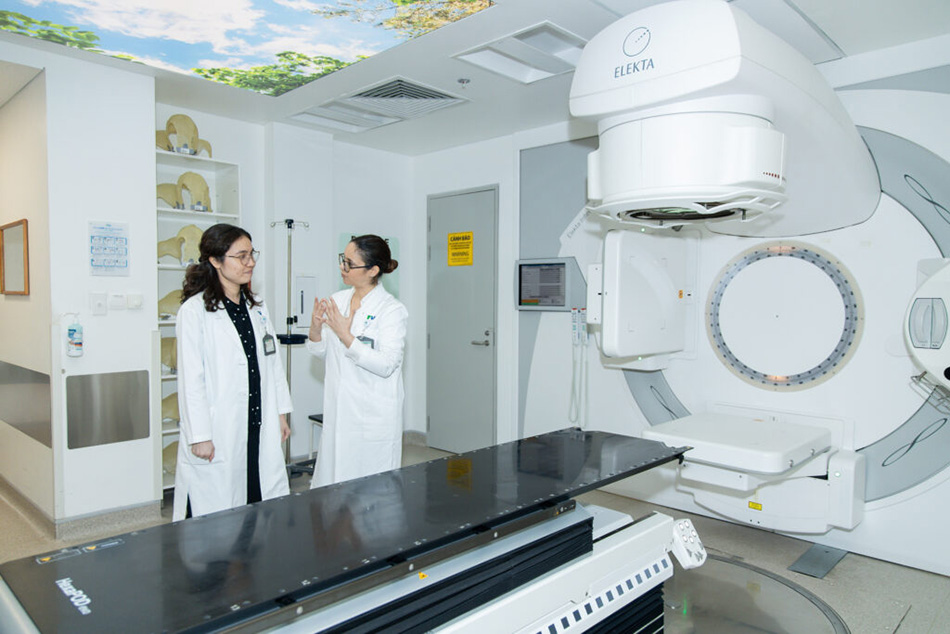
Hy Vong Cancer Care Centre at FV Hospital has invested in and gradually implemented the most advanced techniques in radiation therapy, including Total Body Irradiation (TBI), Stereotactic Body Radiation Therapy (SBRT), Stereotactic Radiosurgery (SRS), and Intensity-Modulated Radiation Therapy (IMRT).
“Always treat patients as if they were your own family.”
Describing her “enthusiastic and meticulous” mentor and department head, Nguyen Huynh Ha Thu, a doctor at Hy Vong Cancer Care Centre, noted: “Working with her always entails a subtle pressure, not because Dr Basma is difficult, but because she is incredibly productive and dedicated. This pressure serves as a significant motivation for me to improve and excel in my work.”
Dr Ha Thu remarks that she has learned a great deal from Dr Basma. Embracing a broad, inclusive approach to issues enables doctors to see more possibilities and provide more comprehensive support and explanations to patients.

“Even with patients who come here with only a few percent chance of success, we still go all out with them until the end, never giving up.”
Dr Basma M’Barek, Head of Hy Vong Cancer Care Centre.
“One of Dr Basma’s most impressive work philosophies is ‘Always treat patients as if they were your own family.’ She knows exactly what needs to be done, her learning capabilities are very strong, and Dr Basma’s dedication to patients is immense.” Dr Ha Thu added.
Currently, Dr Basma serves as the Chairman of the Medical Advisory Board (MAB) for the term 2023-2025 at FV Hospital. Most members of the board have placed their trust in the French head of department due to her professional excellence, research achievements and her sharpness and intelligence in communication.
An interview with Dr Basma may only last an hour—both a brief and lengthy period, considering her busy schedule—but it’s enough time for her to share her professional stories and concerns.
Though she may not delve deeply into future plans, Dr Basma’s insights partially reveal the image of a department head devoted to her work, always striving to deliver the best outcomes for her patients.



